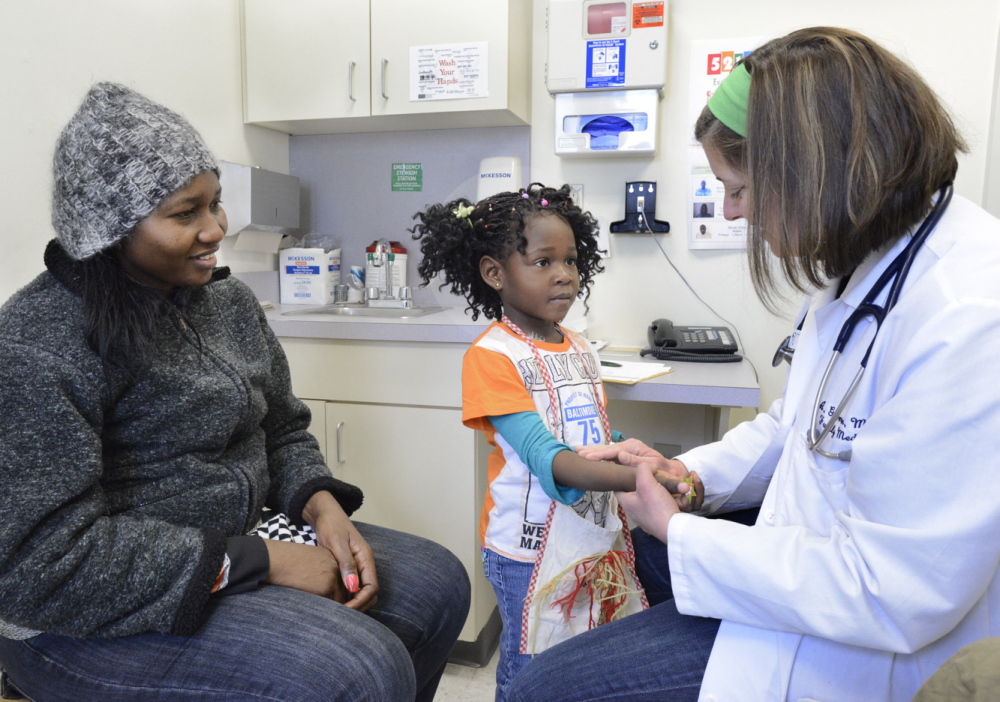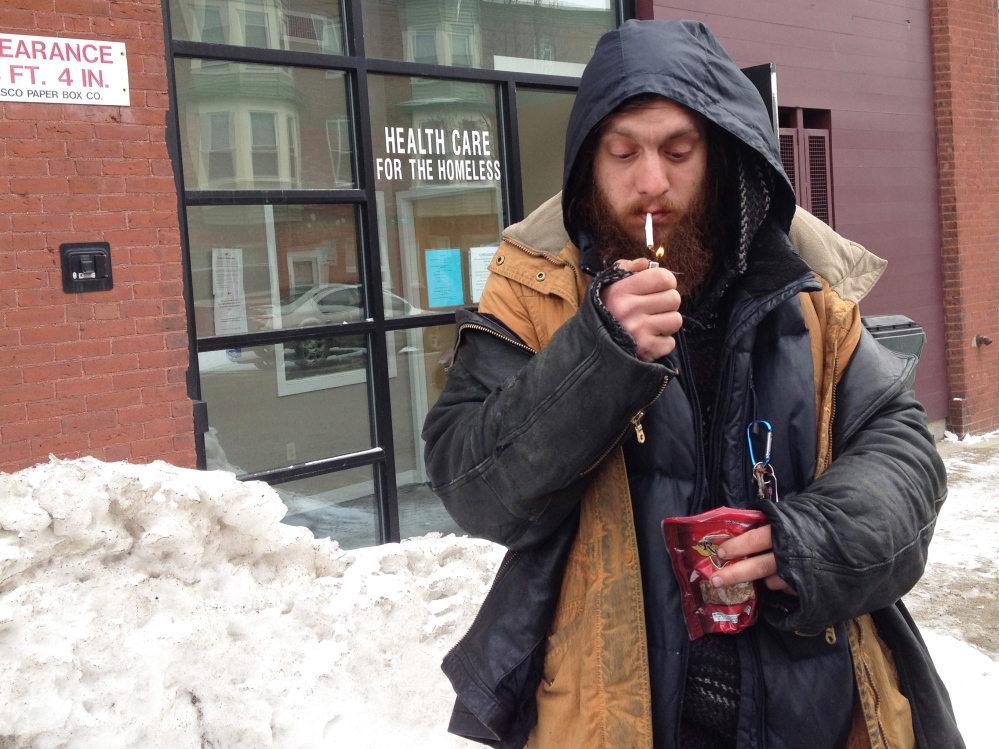The city of Portland has won federal funding to continue operating its Health Care for the Homeless clinic beyond April 1, when it had been scheduled to close.
But how long it will stay open – and what services will be offered – is uncertain.
The clinic is still expected to run out of funding this year, and some patients are concerned about having to leave the place where they have received primary medical care for years. A nearby health center, meanwhile, is hiring staff and gearing up to care for some of those patients.
Portland’s clinic, which serves 2,300 patients, was expected to close at the end of this month after losing a $680,000 federal grant that paid for much of its operating costs.
The new federal funding – $360,000 – is intended to ease the transition for patients, many of whom will get medical care at the Portland Community Health Center, a primary care center that also serves the general public. The new funding will also delay the loss of dozens of full- and part-time jobs until the city-run clinic closes sometime later this year.
The transition is necessary because the nonprofit Portland Community Health Center won the competitive federal grant for $680,000, funding that the city had received since 2009. After losing the grant, the city applied for $500,000 in transitional funding from the U.S. Department of Health and Human Services to keep the Health Care for the Homeless clinic open throughout the rest of the year.
However, the city received only $360,000, so it’s unclear how long the city-run center will remain open and what services it will be able to provide, said Douglas Gardner, the city’s director of health and human services.
“We owe it to our patients, staff and the community to be clear on what we will be able to offer and what we won’t be able to offer during this extended transition period,” Gardner said in an email. Gardner expects to receive clarification from the federal government about what services will be provided with the funding.
The additional funding is the latest development in a process that has caused hard feelings between the city and the nonprofit health center that it helped found and operated from 2009 to 2012. The city and the nonprofit center had an agreement not to compete for the federal funding. But after the city made a clerical error in its initial grant application and had to apply in a secondary round, the nonprofit applied for the funding and beat out the city.
The city’s Health Care for the Homeless clinic is at 20 Portland St. in a section of the city that hosts shelters and other services for the homeless. The Portland Community Health Center is located a half-mile away across from King Middle School on Park Avenue.
Leslie Brancato, chief executive officer of the Portland Community Health Center, said a group of city officials, nonprofits, housing providers and medical providers have started meeting to develop a comprehensive care system.
PCHC has begun hiring additional staff, including Dr. Renee Fay-Leblanc as the new chief medical officer, Brancato said.
Also, PCHC recently signed a lease that will allow it to open a primary care clinic at 63 Preble St., which is across the street from the Preble Street soup kitchen and day shelter, Brancato said. That clinic – like the one on Park Avenue – will serve all types of patients, including homeless and low-income people and refugee populations, and will be easily accessible to people staying at the shelter.
PCHC now serves 800 patients who have been homeless within the past year, and can provide taxi and bus vouchers to people who have difficulty getting to the Park Avenue clinic, Brancato said.
“There has been a lot that has been happening,” she said.
The PCHC expects to serve 1,000 homeless patients in the first year, well short of the 2,300 served by the city-run clinic, which has been open for more than 20 years. That could leave 1,300 homeless people without access to health services.
Brancato said she is confident that the 29 service providers and civil servants who make up the planning group will create a system of care that will prevent people from falling through the cracks. “I’m confident we’re going to figure out a way to serve the people who need the care,” she said.
But some homeless patients are worried.
Matt Coffey, 35, has been a patient at the city clinic for about 10 years. He goes to the clinic whenever he has a health problem, and also has taken advantage of counseling services, but declined to go into detail.
Coffey said the clinic staff is there specifically to help homeless people, some of whom can be anxious, belligerent or incontinent.
“They treat you like you’re a human being,” he said.
Coffey is worried that mixing the homeless population with other types of patients will only lead to trouble. “I don’t think it’s going to be the same thing. I see the cops being called. I see it being a big problem,” said Coffey, who has been homeless off and on since he was 18.
Chris Gerry, 50, has been going to the city clinic for the last month and a half to get treatment for Chronic Obstructive Pulmonary Disease. Before that, Gerry would simply go to a local emergency room and get an inhaler when he needed help. But at the city clinic, he received a full blood test and pneumonia shot, and staff is trying to get him on MaineCare and arrange for him to visit with a pulmonary specialist.
Gerry, who was laid off from Barber Foods in 2012 and has been homeless for the past six months, said he also has anxiety issues and is slow to trust new people. But he has been seeing a counselor at the city clinic who has put him at ease. Now, Gerry is nervous about having to build new relationships with new people.
“It’s too bad they’re closing it. It’s a really nice place,” he said. “I hate starting over with new people.”
Mark Swann, executive director of Preble Street, which raised $1 million to renovate and expand the city-run clinic, remains concerned about the transition of patients.
Swann said the city clinic has five behavioral health counselors, compared with 1.5 at the new facility, and offers dental services.
“Essentially, now we are in a position where we need to deconstruct a strong, viable program and start all over again,” Swann said. “None of this makes sense.
“Preble Street will work with PCHC, of course, to meet the needs of as many of our clients as possible,” he said. “But it is extremely frustrating that we’re in the position in the first place.”
Randy Billings can be contacted at 791-6346 or at:
rbillings@pressherald.com
Twitter: @randybillings
Copy the Story LinkSend questions/comments to the editors.





Success. Please wait for the page to reload. If the page does not reload within 5 seconds, please refresh the page.
Enter your email and password to access comments.
Hi, to comment on stories you must . This profile is in addition to your subscription and website login.
Already have a commenting profile? .
Invalid username/password.
Please check your email to confirm and complete your registration.
Only subscribers are eligible to post comments. Please subscribe or login first for digital access. Here’s why.
Use the form below to reset your password. When you've submitted your account email, we will send an email with a reset code.